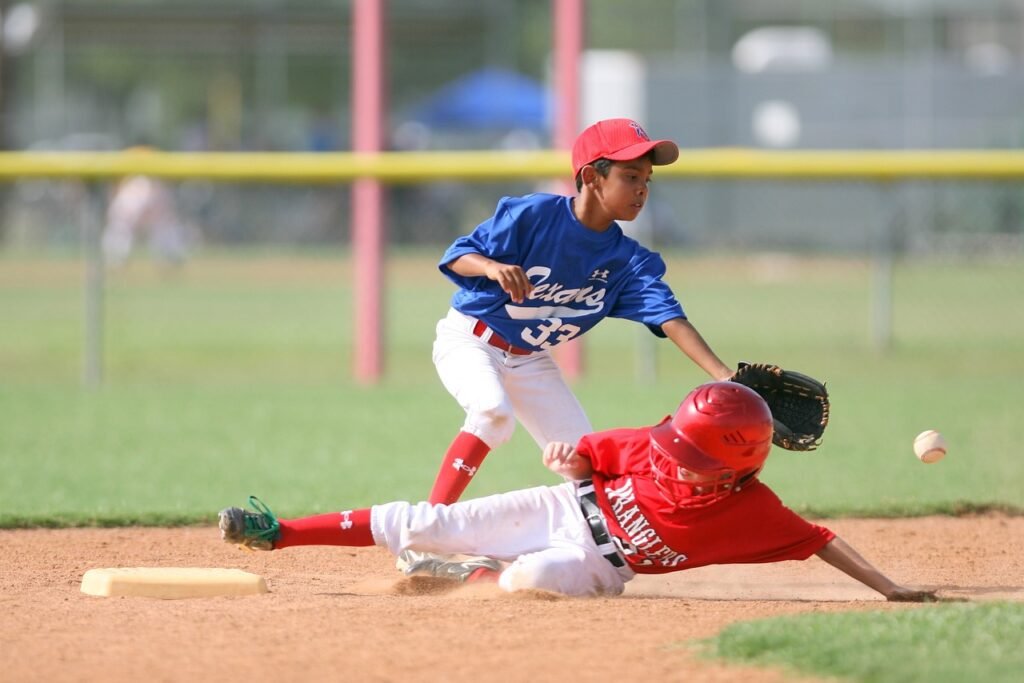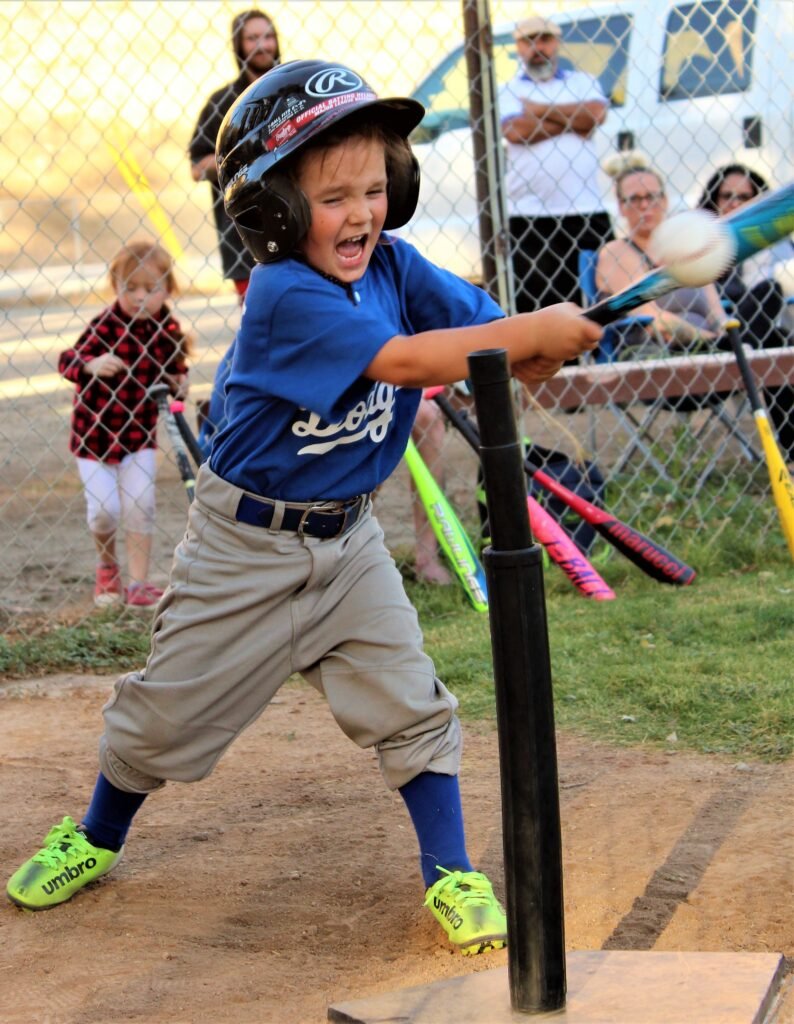Can A 3 Year Old Play T Ball? (A comprehensive guide )
- April 12, 2023
- 1
Are you a proud parent of a curious 3-year-old and want to know can a 3 year old play T Ball? You may be wondering if it’s safe
Are you a proud parent of a curious 3-year-old and want to know can a 3 year old play T Ball? You may be wondering if it’s safe

Are you a proud parent of a curious 3-year-old and want to know can a 3 year old play T Ball? You may be wondering if it’s safe and appropriate for your little one to start playing T Ball at such a young age.
Well, the good news is that T Ball can be a fantastic way to introduce your child to the joys of baseball and foster their love for the game from an early age.
T-Ball is a modified version of baseball designed for young children, typically between the ages of 3 to 6. It focuses on building fundamental skills such as hand-eye coordination, throwing, catching, and hitting.
Many parents may be surprised to learn that 3-year-olds can indeed play T-Ball and can benefit greatly from this early exposure to organized sports. While they may not have the same level of coordination or understanding of the game as older children, they can still have a blast and lay the foundation for future athletic success.
T-Ball is a popular team sport that introduces young children to the fundamentals of baseball in a fun and interactive way. But is 3 years old an appropriate age to start playing?
In this article, we will explore the possibilities of T-Ball for 3-year-olds, providing answers to the questions and concerns you may have as you consider whether your little one is ready to step up to the plate. So, let’s dive in and uncover the possibilities.
Yes, a 3-year-old can typically play T-Ball, as long as they meet the basic physical and cognitive requirements for the sport. T-Ball is designed to be an entry-level sport for young children, usually starting around ages 3-4, to introduce them to the basics of baseball in a safe and age-appropriate manner.

Many experts and coaches in the field of youth sports recognize that tee ball can be a suitable and enjoyable activity for 3-year-olds. While most leagues advertise their tee ball programs for 4-6 year old, some may allow 3-year-olds to participate upon assessment of their readiness.
In fact, many leagues and coaches are open to including 3-year-olds in their tee ball programs, but they may ask parents a few questions to gauge the child’s physical, cognitive, and emotional development.
This approach ensures that the child is physically capable of handling the basics of tee ball, such as swinging, throwing, and running, and that they have the attention span and social skills to participate in a team setting.
By consulting with the league or coach beforehand, parents can determine if their 3-year-old is ready to join the tee ball fun and have a positive experience on the field.
Research has shown that early participation in organized sports can have numerous benefits for young children. It can help improve their motor skills, coordination, and cognitive development.
Playing T-Ball can also foster social skills, teamwork, and sportsmanship at an early age, setting the stage for healthy physical activity habits and a lifelong love for sports. With age-appropriate equipment, instruction, and supervision, 3-year-olds can enjoy T-Ball as a fun and engaging introduction to the world of sports.
Let’s delve into the advantages of playing T-Ball for 3-year-olds and discover how this exciting sport can positively impact your child’s development!
Playing T-Ball can offer numerous benefits for young children, including improving their motor skills, coordination, and cognitive development. It also provides an opportunity for socialization, teamwork, and sportsmanship, laying the foundation for a healthy and active lifestyle. Here are some key advantages of playing Tee ball.
T-Ball involves various physical activities such as hitting, throwing, and catching, which help in the development of hand-eye coordination, gross and fine motor skills.
As children swing the bat, throw and catch the ball, they learn to control their body movements, improve their hand-eye coordination, and develop their motor skills, which are essential for their overall physical development.
T-Ball is typically played in a team setting, which provides an opportunity for young children to learn about teamwork and sportsmanship. They learn to work together with their teammates, communicate, and support each other, fostering a sense of camaraderie and teamwork.
Additionally, T-Ball emphasizes the importance of fair play, following rules, and good sportsmanship, helping children develop positive attitudes towards competition and sports.

T-Ball offers a platform for young children to socialize with their peers, make new friends, and learn valuable social skills. They learn to take turns, share, and communicate effectively with their teammates, coaches, and opponents.
T-Ball also provides opportunities for children to cope with winning and losing, manage emotions, and develop resilience, promoting their emotional intelligence and social development.
As children learn and improve their skills in T-Ball, they gain a sense of accomplishment, leading to an increase in their self-confidence and self-esteem.
Successes, such as hitting the ball or catching it, can provide a sense of pride and motivation for children to continue learning and growing.
This boost in confidence and self-esteem can extend to other areas of their life and contribute to their overall psychological well-being.

Above all, T-Ball is a fun and enjoyable sport for young children. It provides an opportunity for children to engage in physical activity, play with their peers, and experience the joy of the game.
The positive experience of playing T-Ball can cultivate a lifelong love for sports and physical activity, promoting a healthy and active lifestyle in the long run.
When it comes to determining if a 3-year-old child is ready to play T-Ball, there are several factors to consider.
While some children may show interest and aptitude for the sport at an early age, others may require more time to develop the necessary physical and cognitive skills. Here are some points to keep in mind.
while some 3-year-old children may be physically and cognitively ready to play T-Ball, it’s important to assess each child’s individual abilities and interests.
It’s crucial to keep expectations realistic and consider factors such as physical readiness, cognitive development, and genuine interest before enrolling your child in T-Ball at this age.
It’s also important to prioritize your child’s enjoyment and ensure that they have a positive experience in their early introduction to sports.
In conclusion, the question “Can a 3-year-old play T-Ball?” is one that requires careful consideration of various factors, including the child’s physical development, cognitive abilities, and individual interests.
While some 3-year-olds may be ready to participate in T-Ball and potentially unleash their sports potential, others may require more time and readiness before engaging in organized sports.
As a parent, it’s essential to assess your child’s abilities, interests, and motivation to ensure a positive and enjoyable experience. Remember to prioritize your child’s well-being and readiness over external pressures or expectations.
By taking a thoughtful approach and considering your child’s individual needs, you can make an informed decision about whether or not your 3-year-old is ready to play T-Ball and embark on their sports journey.
Here are some frequently asked question and their best answers.
1 Comment
[…] baseball players learn the basics of the game by playing tee ball. The best tee ball bat is one of the most crucial elements to a successful start in this exciting sport. Introducing […]